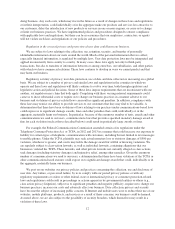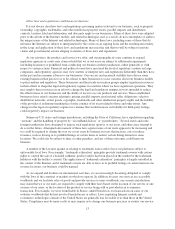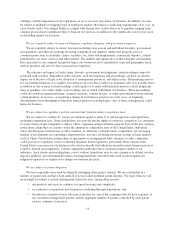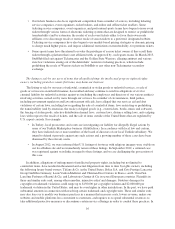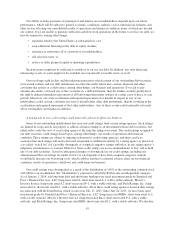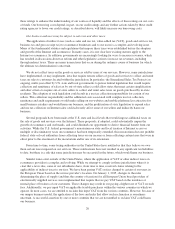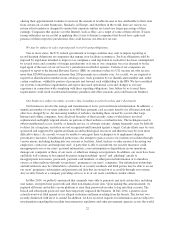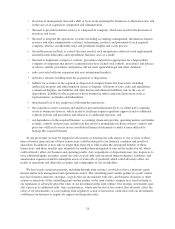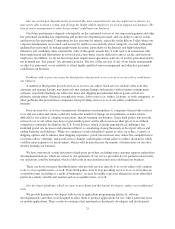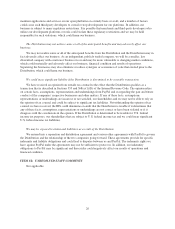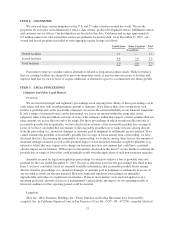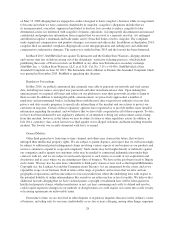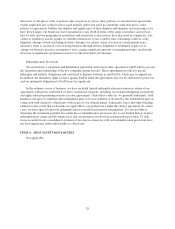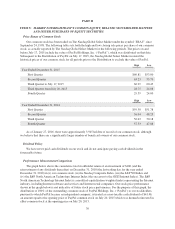eBay 2015 Annual Report Download - page 33
Download and view the complete annual report
Please find page 33 of the 2015 eBay annual report below. You can navigate through the pages in the report by either clicking on the pages listed below, or by using the keyword search tool below to find specific information within the annual report.In certain jurisdictions, we collect and remit indirect taxes on our fees and pay taxes on our purchases of
goods and services. However, tax authorities may raise questions about our calculation, reporting and collection
of taxes and may ask us to remit additional taxes, as well as the proper calculation of such taxes. Should any new
taxes become applicable or if the taxes we pay are found to be deficient, our business could be harmed.
A taxing authority may seek to impose a tax collection, reporting or record-keeping obligation on companies
that engage in or facilitate ecommerce. For example, the U.S. Internal Revenue Service (IRS) now requires that
certain payments to sellers be reported to the sellers and the IRS on an annual basis. Any failure by us to meet
these requirements could result in substantial monetary penalties and other sanctions and could harm our
business. Taxing authorities may also seek to impose tax collection or reporting obligations based on the location
of the product or service being sold or provided in an ecommerce transaction, regardless of where the respective
users are located. Some jurisdictions could assert that we are responsible for tax on the underlying goods or
services sold on our sites. Imposition of a record keeping or tax collecting requirement could decrease seller
activity on our sites and would harm our business. Tax authorities may also require us to help ensure compliance
by our users by promulgating legislation regulating professional sellers, including tax reporting and collection
requirements. In addition, we have periodically received requests from tax authorities in many jurisdictions for
information regarding the transactions of large classes of sellers on our sites, and in some cases we have been
legally obligated to provide this data. The imposition of any requirements on us to disclose transaction records
for all or a class of sellers to tax or other regulatory authorities or to file tax forms on behalf of any sellers,
especially requirements that are imposed on us but not on alternative means of ecommerce, and any use of those
records to investigate, collect taxes from or prosecute sellers, could decrease seller activity on our sites and harm
our business.
We may have exposure to greater than anticipated tax liabilities.
The determination of our worldwide provision for income taxes and other tax liabilities requires estimation
and significant judgment, and there are many transactions and calculations where the ultimate tax determination
is uncertain. Like many other multinational corporations, we are subject to tax in multiple U.S. and foreign tax
jurisdictions and have structured our operations to reduce our effective tax rate. Our determination of our tax
liability is always subject to audit and review by applicable domestic and foreign tax authorities, and we are
currently undergoing a number of investigations, audits and reviews by taxing authorities throughout the world,
including with respect to our business structure. Any adverse outcome of any such audit or review could harm
our business, and the ultimate tax outcome may differ from the amounts recorded in our financial statements and
may materially affect our financial results in the period or periods for which such determination is made. While
we have established reserves based on assumptions and estimates that we believe are reasonable to cover such
eventualities, these reserves may prove to be insufficient.
In addition, our future income taxes could be adversely affected by a shift in our jurisdictional earning mix,
by changes in the valuation of our deferred tax assets and liabilities, as a result of gains on our foreign exchange
risk management program, or changes in tax laws, regulations, or accounting principles, as well as certain
discrete items.
In light of continuing fiscal challenges in certain U.S. states and in many countries in Europe, various levels
of government are increasingly focused on tax reform and other legislative action to increase tax revenue,
including corporate income taxes. For example, the economic downturn reduced tax revenues for United States
federal and state governments, and a number of proposals to increase taxes from corporate entities have been
implemented or are being considered at various levels of government. These include a number of proposals to
modify the U.S. federal income tax laws applicable to companies, like ours, operating in multiple U.S. and
foreign jurisdictions which, if enacted, could materially increase our effective tax rate. A number of U.S. states
have attempted to increase corporate tax revenues by taking an expansive view of corporate presence to attempt
to impose corporate income taxes and other direct business taxes on companies that have no physical presence in
their state, and taxing authorities in foreign jurisdictions may take similar actions. Many U.S. states are also
21



